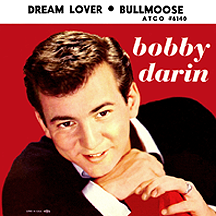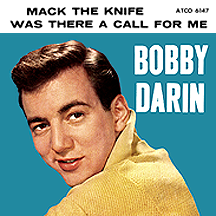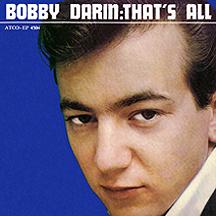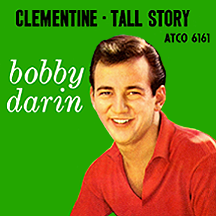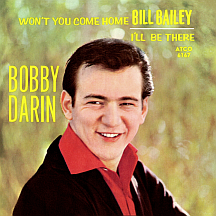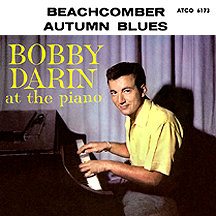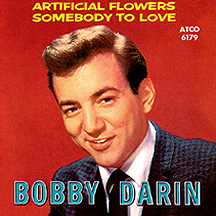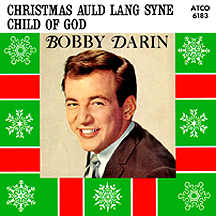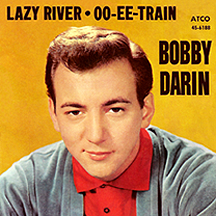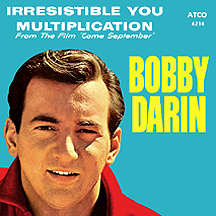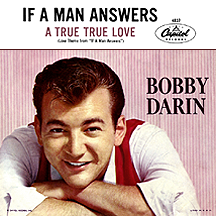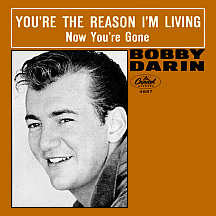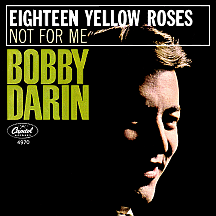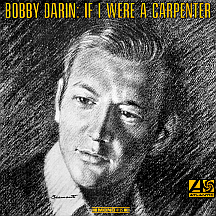BOBBY DARIN
Bobby Darin is the best example I know of an artist displaying great proficiency and versatility on a tight deadline. When he was about eight years old, he began having frequent attacks of rheumatism and soon after became aware of a doctor's diagnosis to a family member that he would not live long, perhaps into his teens or with luck to the age of 30 at the very outside. This particular kid had show business dreams and the potential talent to back them up, so he decided he had to move quickly to get where he was going and cram as many of those dreams as possible into his life.
Born Robert Walden Cassotto on May 14, 1936, Bobby's childhood was difficult for more reasons than just those health issues. Growing up in a poor section of the Bronx, his immediate family members weren't up front with him about their true family roles. The man he thought was his father, Samuel Cassotto, was actually his grandfather, and had died in prison shortly before Bobby was born. His sister Nina, 17 at the time of his birth, was revealed much later to be his mother, and she wouldn't say who the father was, except to point out that she didn't tell the guy about her condition, so he never even realized he had a son. This meant Polly Cassotto, for many years taking the role of his mother, was actually his grandmother. The reasons for this elaborate deception are unsure, but with the perceived shame for the family resulting from Nina's teenage pregnancy, it must have seemed like the only option at the time. Polly was a caring mother/grandmother, though, exposing the child at an early age to music and taking him to see live performances in opera houses in Manhattan and other venues. He became fascinated by many musical styles, from classical and jazz to big band and blues, and learned to play several instruments in his preteen and teenage years, including piano, guitar, drums and even the xylophone.
Highly intelligent and disciplined, he was a top student at the Bronx High School of Science and was granted a scholarship to Hunter College. He became friends during high school with another musically-ambitious student, future industry mogul Don Kirshner. He dropped out of college to pursue his music career at small New York City clubs. When it came to choosing a professional name, legend has it that he simply opened a telephone book, put his index finger on the page, and it landed on "Darin." Cassotto became Bobby Darin, which he was known as for the rest of his life and career.
His first record deal came in 1956 with Decca, whose executives felt there was room in folk music for a singer like Bobby. The first single release was "Rock Island Line" (a traditional song closely connected with Leadbelly, who recorded it several different times between 1937 and '49, and a major hit in 1956 by Britain's skiffle king Lonnie Donegan), showing artist credit as Bobby Darin and the Jaybirds. He performed the song on the CBS variety series Stage Show, his television debut. Still, Darin's cover of the Donegan hit failed, as did a few follow-up singles for the label. His first hint of success came as the writer of what evolved into a rock song he'd cowritten with Kirshner, "Wear My Ring," which hit the charts by Gene Vincent and his Blue Caps as the flip side of the 1957 hit "Lotta Lovin'."
Without a recording contract in mid-'57, taking the minor success of Vincent's single as a cue, he focused his efforts on songwriting. Working for a time at the Brill Building on Broadway in Manhattan, the hub of the songwriting universe in the '50s and '60s, Darin became acquainted with another struggling singer, Connie Francis. She had been recording for MGM Records since 1955, with several releases and no luck whatsoever. Time was running out on Connie's contract and Darin had a shot at coming up with a song that could break her. What happened instead was an immediate attraction that led to a serious relationship in spite of the disapproval of Connie's father, and later a planned elopement that was scrapped when dad produced a gun! They parted, and Francis went on to great fame and success (the top-selling female singer of the era, no less) without Darin's input.
After catching a Darin performance in 1957, Atlantic Records co-founder Herb Abramson signed him to the company's Atco label; his first single, "I Found a Million Dollar Baby," was followed by two more that year, yet still a hit would not materialize. Frustrated, Darin offered the master take of "Early in the Morning," a song he'd written with Woody Harris, to Brunswick Records. To avoid a sticky situation with Atlantic, they released the single under the name The Ding-Dongs, to further public indifference. By this time Bobby was sensitive about his appearance, particularly his rapidly thinning hair, and took to wearing a toupee. Abramson had become much less enthusiastic with his nonproductive discovery, which led to a turning point in the young singer-songwriter's career. He would wait for hours in the Atlantic offices hoping to meet with Abramson, so to fill the time he played around on an upright piano that was in the waiting room. Atlantic president Ahmet Ertegun heard those impromptu performances outside his own office and came out to talk and hang out. Eventually they became good friends and Ertegun decided to try his hand at producing the singer. The two would work closely together for many years.
Top-rated New York radio deejay Murray the "K" Kaufman put forth a challenge to Bobby Darin one day: to write a song, on the spot, that started with the words 'Splish splash, I was taking a bath,' something Kaufman's mother had come up with. Bobby threw the song together in minutes, just for fun, and shortly after decided to record it, complete with opening "bubble" sound effects. "Splish Splash" became one of the biggest hits of 1958, landing Darin on American Bandstand and other high-profile shows. Bobby, Murray and Murray's mom all shared the songwriter royalties. Atlantic found out about the Ding-Dongs record around this time, halting any further pressings on Brunswick and releasing "Early in the Morning" on Atco as The Rinky-Dinks, after which it competed with a version by Buddy Holly, released on Brunswick sister label Coral; both hit the top 40. Darin worked at fever pitch after this with a steady stream of sometimes-silly, always-catchy pop-rock hits, "Queen of the Hop" and "Plain Jane" leading to the more ambitious (and biggest hit yet) "Dream Lover" in the spring of 1959 (backed with the wildly rocking "Bullmoose," describing a party that even an earthquake couldn't stop!).
The year-long string of big hits gave Darin more creative control and opportunites outside music, including a small acting role in an October 1959 episode of the Jackie Cooper TV series Hennesey. Musically he decided to try singing in a big band style, a risky throwback approach that seemed almost certain to end his career. He chose "Mack the Knife," an already much-recorded number from The Threepenny Opera, a 1928 German musical that had more recently been remade as a very successful Tony Award-winning Broadway show starring Lotte Lenya (later notorious for her role as the evil Rosa Klebb in the James Bond film From Russia With Love), who's mentioned by name in the song's lyrics. I met Ahmet Ertegun some years ago and he told me that the session for "Mack" was really something to behold. All doubts went out the window when Darin created a jazzy, finger-snappin' sensation in the studio during the recording of the song. Everyone involved knew it would be a hit, but what a hit! Not merely a number one smash, it was the biggest-selling record of 1959, going on to win the Grammy Award for Record of the Year and another for Darin as Best New Artist (overlooking the fact that he had been popular prior to 1959, one of the many quirks in Grammy rules that persist today).
His follow-up single was the Charles Trenet song "La Mer" (French for "the sea"). With english lyrics by Jack Lawrence, "Beyond the Sea" was another smash. More pop standards followed: "Clementine," "Won't You Come Home Bill Bailey," "Artificial Flowers," "Lazy River" and "You Must Have Been a Beautiful Baby." The success of these records placed him in a new arena with the likes of Frank Sinatra (reportedly never a big Darin fan), playing the top Vegas casinos down the street from the Rat Pack and breaking attendance records at New York's Copacabana night club.
Atco continued taking advantage of his rock fan base, releasing earlier recordings that included "Somebody to Love" and teen-leaning singles like "I'll Be There" (a remake in 1964 was a big hit for England's Gerry and the Pacemakers) and Bobby's interpretation of the Nat "King" Cole classic "Nature Boy." When he did the session for his seasonal 1960 single "Christmas Auld Lang Syne," he ventured into gospel on the flip side, "Child of God." Bobby showed off his piano skills with a catchy instrumental piece, "Beachcomber." He handled the task of singing in a foreign language with flair on "Milord," made famous a few years earlier by Édith Piaf. He also scored a few hits as a songwriter in the early 1960s, including The Coasters' "Wait a Minute," Wayne Newton's "Shirl Girl" and "Jailer, Bring Me Water" by Trini Lopez. So what would be next for the guy who'd mastered several musical genres? It was time to make movies!
Come September, a romantic comedy released in 1961 which he also composed the music for, was his first major film role and it led to a Golden Globe win in the Most Promising Newcomer category. It starred Rock Hudson and Gina Lollobrigida, with Darin and Gidget star and teen idol Sandra Dee (born Alexandra Zuck), just 18 at the time of filming, in supporting roles. Romance on the set quickly led to wedding bells. Bobby and Sandra lived like the stars they were, buying an expensive Los Angeles home with a modern, angular, utopian-type design. Bobby also paid big bucks (over 100,000 dollars) for a flashy car, the DiDia 150 (created by clothing designer Andy DiDia), a limited-edition 1960-model metallic red "dream concept" auto that took the popular trend of cars with fins and other protruding outer accessories onto a space-age level of exaggeration and flashiness. The couple was often spotted driving it around Los Angeles in the '60s.
With success in movies in addition to everything else, Darin juggled his music and film careers for the next few years, with a starring role in an early John Cassavetes-directed effort, Too Late Blues, and a supporting part as a shell-shocked psychiatric patient at an Army Air Corps hospital in Captain Newman, M.D. (starring Gregory Peck), a performance that garnered Bobby a 1963 Academy Award nomination for Best Supporting Actor (which he lost to film vet Melvyn Douglas for Hud). His acting craft had quickly become as polished as his singing. He was now running on all cylinders.
After one last top ten hit on Atco, "Things," Darin left the label for a lucrative deal with Capitol Records. The first release was the title track of another film he made with Sandra Dee, "If a Man Answers," this time as the top-billed stars. Then Capitol found themselves playing along with his latest whim as a would-be country singer, with "You're the Reason I'm Living" and "18 Yellow Roses," both top ten pop hits (though he wasn't widely embraced by country fans). Other Capitol singles "Treat My Baby Good" and "Be Mad Little Girl" were more in the pop-rock department. An association with Disney resulted in his theme from the film That Darn Cat! in 1965, about the same time he released "Gyp the Cat," a new twist on the "Mack the Knife" legend.
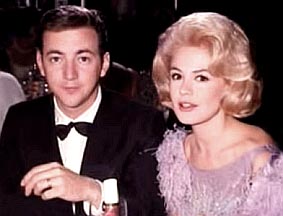
In 1966, his association with Capitol at an impasse, Darin went back to Atlantic (this time appearing on the parent label), and even further back to the music he'd started with a decade earlier and hadn't yet conquered: folk. "If I Were a Carpenter," penned by folk-rocker Tim Hardin, became his first top ten hit in three years (he returned the favor by writing Hardin's 1969 hit "Simple Song of Freedom," a political anthem that took hold in the unrest of the late-'60s and early-'70s Vietnam era). "Lovin' You," written by John Sebastian of The Lovin' Spoonful, was Bobby's last big hit in 1967. He was deeply involved in politics by this time, causing a strain on his recently-faltering marriage which ended in divorce that year. Joining Robert Kennedy's presidential campaign, he often traveled with the extremely popular politican and was with Kennedy when he arrived in Los Angeles on June 4, 1968, two days before his assassination. This devastating occurrence coupled with his split from Sandra sent Bobby into a tailspin. He sold the house and most of his possessions, moving to a remote area near Big Sur, California, where he led a laid-back existence in a small trailer for about a year.
Upon returning to Los Angeles in 1969, he stopped wearing his hairpiece, grew a mustache, and opted to concentrate on folk music and protest songs, starting up his own label, Direction Records, and releasing a single, "Long Line Rider," which made it to the lower reaches of the pop charts. He had an idea for awhile to leave the name "Bobby" behind him, putting out one or two records under the name Bob Darin and, for his return to movie acting that year, he appeared in the Richard Brooks film The Happy Ending as Robert Darin.
In the early 1970s Darin's health problems started to catch up with him, but he fought back by agreeing to undergo heart surgery in 1971, which kept him from working most of that year while recovering. Bouncing back in '72 and reembracing the image that had made him a star, he signed a record deal with Motown at a time when label founder Berry Gordy was attempting to expand the operation beyond his stable of successful soul artists. He did some acting in the TV shows Ironside, Night Gallery and others, and even hosted his own NBC variety series The Bobby Darin Show from July through September 1972, brought back for additional episodes starting in January 1973 and running until April of that year. Then in June he married Andrea Yeager and through most of this period continued to attract maximum-capacity crowds to his live shows in Las Vegas.
Turns out the doctor who said Darin wouldn't make it to 30 wasn't too accurate...he was about seven years off. It was a bonus for the world to be able to watch this extraordinary performer's evolving talent awhile longer. His new wife Andrea complained at how hard he pushed himself in his quest to pack as many accomplishments into the shorter lifetime he expected to have, pleading with him to rest and slow down the pace, but by then it was too late. In December 1973 he was admitted to Cedars-Sinai Medical Center for a second go-round at heart surgery. He died on December 20, in spite of the efforts of a team of five doctors working several hours straight.
An interesting footnote, something I wasn't aware of until Sandra Dee passed away in 2005, is that she never remarried. Bobby Darin truly was the love of her life. And she wasn't the only one who refused to give him up after so many years...there are many millions of music fans who share her affection. We won't give him up either.
NOTABLE SINGLES:
- Rock Island Line - 1956
as Bobby Darin and the Jaybirds - The Greatest Builder - 1956
- I Found a Million Dollar Baby - 1957
- Early in the Morning - 1958
as the Ding-Dongs - Early in the Morning - 1958
as the Rinky-Dinks - Splish Splash - 1958
- Queen of the Hop - 1958
- Mighty Mighty Man - 1958
as the Rinky-Dinks - Plain Jane - 1959
- Dream Lover /
Bullmoose - 1959 - Mack the Knife - 1959
- Beyond the Sea - 1960
- Clementine - 1960
- Won't You Come Home Bill Bailey /
I'll Be There - 1960 - Beachcomber - 1961
- Artificial Flowers /
Somebody to Love - 1961 - Christmas Auld Lang Syne /
Child of God - 1961 - Lazy River - 1961
- Nature Boy - 1961
- (Theme from) Come September - 1961
- You Must Have Been a Beautiful Baby - 1961
- Irresistible You /
Multiplication - 1961 - What'd I Say - 1962
- Things - 1962
- Baby Face - 1962
- If a Man Answers /
A True, True Love - 1962 - I Found a New Baby - 1962
- You're the Reason I'm Living - 1963
- 18 Yellow Roses /
Not For Me - 1963 - Treat My Baby Good - 1963
- Be Mad Little Girl - 1963
- I Wonder Who's Kissing Her Now - 1964
- Milord - 1964
- The Things in This House - 1964
- Hello, Dolly! - 1965
- Venice Blue - 1965
- Gyp the Cat - 1965
- Mame - 1966
- If I Were a Carpenter - 1966
- The Girl That Stood Beside Me - 1966
- Lovin' You - 1967
- The Lady Came From Baltimore - 1967
- Darling Be Home Soon - 1967
- Long Line Rider - 1969
- Jive - 1969
as Bob Darin - Happy - 1973


